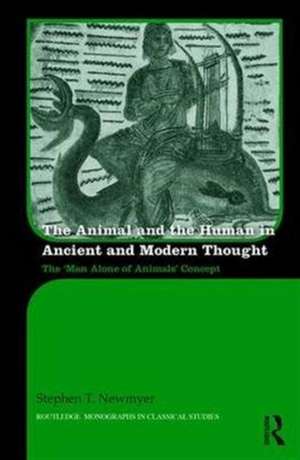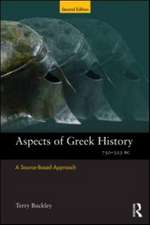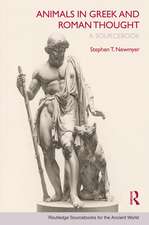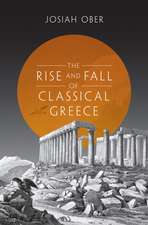The Animal and the Human in Ancient and Modern Thought: The ‘Man Alone of Animals’ Concept: Routledge Monographs in Classical Studies
Autor Stephen Newmyeren Limba Engleză Hardback – 28 noi 2016
This is the first book-length study of the ‘man alone of animals’ topos in classical literature, not restricting its analysis to Greco-Roman claims of man’s intellectual uniqueness, but including classical assertions of man’s physiological and emotional uniqueness. It supplements this analysis of ancient manifestations with an examination of how the commonplace survives and has been restated, transformed, and extended in contemporary ethological literature and in the literature of the animal rights and animal welfare movements. Author Stephen T. Newmyer demonstrates that the anthropocentrism detected in Greek applications of the ‘man alone of animals’ topos is not only alive and well in many facets of the current debate on human-animal relations, but that combating its negative effects is a stated aim of some modern philosophers and activists.
| Toate formatele și edițiile | Preț | Express |
|---|---|---|
| Paperback (1) | 380.84 lei 6-8 săpt. | |
| Taylor & Francis – 10 dec 2019 | 380.84 lei 6-8 săpt. | |
| Hardback (1) | 1106.81 lei 6-8 săpt. | |
| Taylor & Francis – 28 noi 2016 | 1106.81 lei 6-8 săpt. |
Din seria Routledge Monographs in Classical Studies
-
 Preț: 310.65 lei
Preț: 310.65 lei -
 Preț: 312.65 lei
Preț: 312.65 lei -
 Preț: 310.81 lei
Preț: 310.81 lei -
 Preț: 311.43 lei
Preț: 311.43 lei -
 Preț: 325.06 lei
Preț: 325.06 lei -
 Preț: 311.37 lei
Preț: 311.37 lei -
 Preț: 312.02 lei
Preț: 312.02 lei - 9%
 Preț: 935.67 lei
Preț: 935.67 lei - 9%
 Preț: 1039.83 lei
Preț: 1039.83 lei -
 Preț: 310.37 lei
Preț: 310.37 lei - 9%
 Preț: 970.53 lei
Preț: 970.53 lei -
 Preț: 312.56 lei
Preț: 312.56 lei -
 Preț: 311.18 lei
Preț: 311.18 lei -
 Preț: 325.55 lei
Preț: 325.55 lei -
 Preț: 309.90 lei
Preț: 309.90 lei -
 Preț: 311.41 lei
Preț: 311.41 lei - 9%
 Preț: 936.87 lei
Preț: 936.87 lei - 8%
 Preț: 383.06 lei
Preț: 383.06 lei - 48%
 Preț: 570.60 lei
Preț: 570.60 lei -
 Preț: 488.71 lei
Preț: 488.71 lei - 29%
 Preț: 995.97 lei
Preț: 995.97 lei -
 Preț: 482.27 lei
Preț: 482.27 lei - 18%
 Preț: 946.74 lei
Preț: 946.74 lei -
 Preț: 484.47 lei
Preț: 484.47 lei - 15%
 Preț: 427.16 lei
Preț: 427.16 lei -
 Preț: 369.77 lei
Preț: 369.77 lei -
 Preț: 386.77 lei
Preț: 386.77 lei - 18%
 Preț: 1109.51 lei
Preț: 1109.51 lei - 30%
 Preț: 849.65 lei
Preț: 849.65 lei - 23%
 Preț: 321.20 lei
Preț: 321.20 lei - 18%
 Preț: 956.39 lei
Preț: 956.39 lei - 15%
 Preț: 427.16 lei
Preț: 427.16 lei - 18%
 Preț: 1060.25 lei
Preț: 1060.25 lei - 15%
 Preț: 427.16 lei
Preț: 427.16 lei - 18%
 Preț: 1119.16 lei
Preț: 1119.16 lei -
 Preț: 371.71 lei
Preț: 371.71 lei -
 Preț: 452.14 lei
Preț: 452.14 lei - 26%
 Preț: 765.59 lei
Preț: 765.59 lei - 30%
 Preț: 819.48 lei
Preț: 819.48 lei -
 Preț: 416.22 lei
Preț: 416.22 lei - 18%
 Preț: 1050.78 lei
Preț: 1050.78 lei
Preț: 1106.81 lei
Preț vechi: 1349.76 lei
-18% Nou
Puncte Express: 1660
Preț estimativ în valută:
211.80€ • 226.47$ • 176.58£
211.80€ • 226.47$ • 176.58£
Carte tipărită la comandă
Livrare economică 17 aprilie-01 mai
Preluare comenzi: 021 569.72.76
Specificații
ISBN-13: 9780415837347
ISBN-10: 0415837340
Pagini: 168
Dimensiuni: 156 x 234 x 11 mm
Greutate: 0.39 kg
Ediția:New.
Editura: Taylor & Francis
Colecția Routledge
Seria Routledge Monographs in Classical Studies
Locul publicării:Oxford, United Kingdom
ISBN-10: 0415837340
Pagini: 168
Dimensiuni: 156 x 234 x 11 mm
Greutate: 0.39 kg
Ediția:New.
Editura: Taylor & Francis
Colecția Routledge
Seria Routledge Monographs in Classical Studies
Locul publicării:Oxford, United Kingdom
Public țintă
Postgraduate and UndergraduateCuprins
1. Introduction: "Man Alone of Animals": An Ancient Commonplace and Its Survivals
2. "Man Alone of Animals": Three Classic Texts
3. The Philosophical Underpinnings of the Concept: Why Such a Concept in Classical Thought?
4. What Makes Man Human? The Reign of Logos
5. The Importance of Being Rational: Logos and Moral Value
6. Body Image: Physiology and the Rise of Civilization
7. Animal Affect: Does Man Alone of Animals Experience Emotions?
2. "Man Alone of Animals": Three Classic Texts
3. The Philosophical Underpinnings of the Concept: Why Such a Concept in Classical Thought?
4. What Makes Man Human? The Reign of Logos
5. The Importance of Being Rational: Logos and Moral Value
6. Body Image: Physiology and the Rise of Civilization
7. Animal Affect: Does Man Alone of Animals Experience Emotions?
Recenzii
What makes the human animal exceptional? Do other animals have reason? Language? Emotions? Can they be moral or just? In this thought-provoking book, Newmyer examines both the various ways in which Greek and Roman authors confirmed or challenged the idea of human exceptionalism, and how anthropocentrism is a central component of current debates on human-animal relations. Suitable for a wide audience, the book helpfully presents the complexity of ancient and contemporary thinking on the human-animal divide.
- Dr Daniella Widdows, Hampden-Sydney College, USA
"This book is about the topos of "Man alone of animals" created in the classical Greek World. ... The works concludes with a reflection on ancient science anthropocentrism and its survival through history."
- Touwaide, Byzantinische Zeitschrift issue 110 (= 2017/4).
- Dr Daniella Widdows, Hampden-Sydney College, USA
"This book is about the topos of "Man alone of animals" created in the classical Greek World. ... The works concludes with a reflection on ancient science anthropocentrism and its survival through history."
- Touwaide, Byzantinische Zeitschrift issue 110 (= 2017/4).
Descriere
This is the first book-length study of the ‘man alone of animals’ topos in classical literature, not restricting its analysis to Greco-Roman claims of man’s intellectual uniqueness, but including classical assertions of man’s physiological and emotional uniqueness. It supplements this analysis of ancient manifestations with an examination of how the commonplace survives and has been restated, transformed, and extended in contemporary ethological literature and in the literature of the animal rights and animal welfare movements. Author Stephen T. Newmyer demonstrates that the anthropocentrism detected in Greek applications of the ‘man alone of animals’ topos is not only alive and well in many facets of the current debate on human-animal relations, but that combating its negative effects is a stated aim of some modern philosophers and activists.
Notă biografică
Stephen T. Newmyer is Professor of Classics at Duquesne University, USA. He is author of several books and articles, most recently Animals, Rights, and Reason in Plutarch and Modern Ethics (Routledge, 2006) and Animals in Greek and Roman Thought: A Sourcebook (Routledge, 2011).













